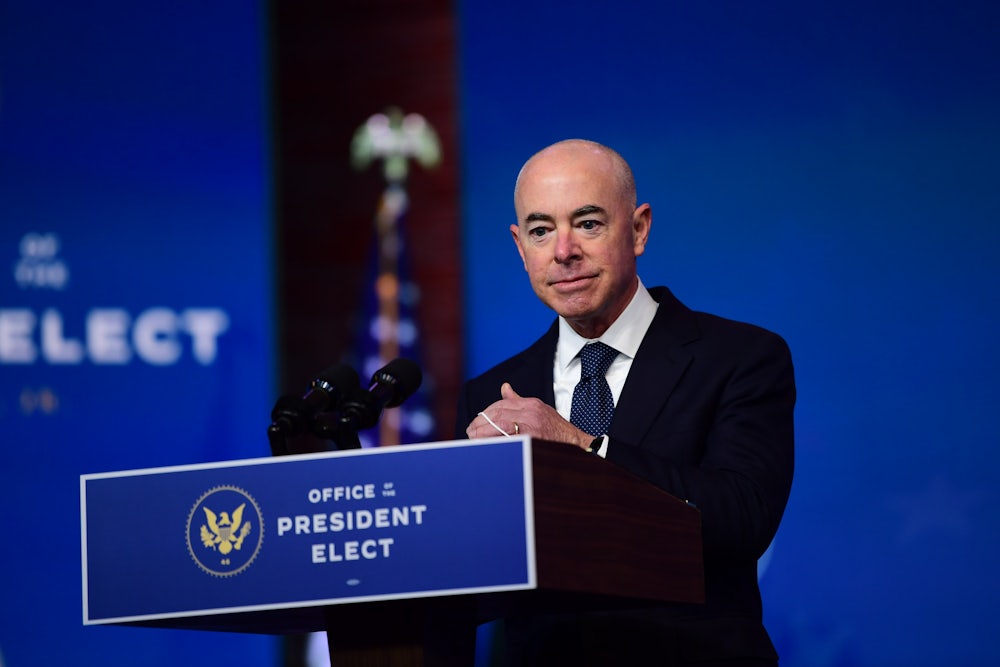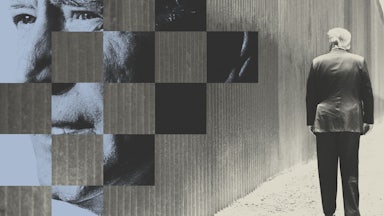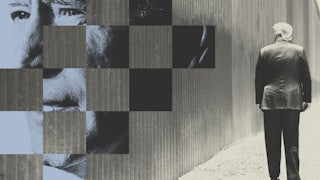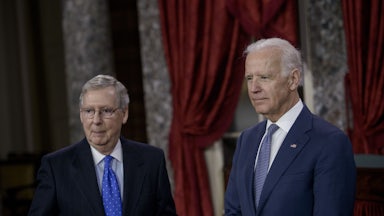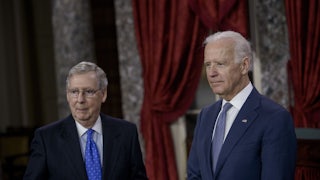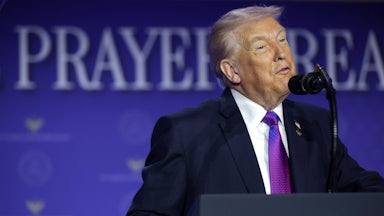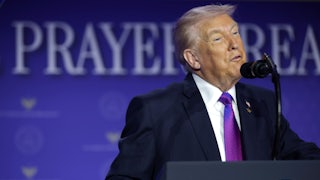“Probably the battle of Waterloo was won on the playing-fields of Eton, but the opening battles of all subsequent wars have been lost there.”
—George Orwell, The Lion and the Unicorn, 1941
Future generations may well wonder how it came to pass that the federal government’s homeland security policy fell into the hands of a select group of people raised within a mere 23 neighborhoods inside the Los Angeles Basin, situated south of the Santa Monica Mountains, west of La Cienega Boulevard, north of the Santa Monica Freeway, and east of the Pacific Ocean. The area is known locally as the Westside. I grew up there myself from the age of 12—but I have no ready answer for the curious.
President-elect Joe Biden’s nominee for homeland security secretary is Alejandro Mayorkas, who was one year behind me at Beverly Hills High School. Biden has also named Elizabeth Sherwood-Randall to be White House homeland security adviser. Sherwood-Randall started out one year behind me at Beverly High but skipped a year and graduated with me in 1976. Michèle Flournoy, whom Biden came very close to nominating for defense secretary, and who will probably end up performing some high-ranking national security function in his administration, was three years behind me at Beverly High.
Washington’s national security establishment is being taken over by Normans—“Normans” being the somewhat lame term for graduates of Beverly High, so named because the school was (supposedly) built in the architectural style that flourished in England after the Norman Conquest. Beverly High was built in 1927, the same year the talkies came in with The Jazz Singer, on a plot of land adjacent to what would later be the backlot of Twentieth Century Fox. Inevitably, Normans assumed a heavy presence in show business: Betty White, Barry Diller, Nicholas Cage, Albert Brooks, and so on.
More recently, though, Beverly High has been drifting into a role vaguely comparable to that of the ivy-laden New England prep schools that educated the moneyed WASPs who guided foreign policy during World War II and the Cold War. A story that ended unhappily, one recalls with a wince, in the deep muddy of Vietnam.
The Episcopacy’s East Coast temples of ruling-class wisdom, known collectively as Saint Grottlesex, are giving way not only to Beverly High but also to assorted other public and private high schools scattered across the Westside’s sunny 100 square miles. Sherwood-Randall will effectively replace Stephen Miller, Trump’s de facto homeland security adviser, who graduated from Santa Monica High School (“Samohi”) in 2003. Another Trump White House aide, who shares Miller’s strongly ethno-nationalist interest in immigration policy, is Julia Hahn, who grew up in Beverly Hills and graduated from Harvard-Westlake School in 2009. Hahn, a protégé of Laura Ingraham and Steve Bannon, followed Bannon from Breitbart into the Trump White House. The late Andrew Breitbart, founder of Breitbart, graduated from the Brentwood School in 1986.
Much further from the center of power, my friend Mickey Kaus (Beverly High, ’69) blogs and tweets about immigration issues. Until this past May, I exerted even more negligible—and much more benign—influence over immigration policy as editor of Politico’s Employment and Immigration section.
Saint Grottlesex produced like-minded government officials who embraced “virtues that now seem almost quaint” and felt “self-confident enough to be selfless,” as Walter Isaacson and Evan Thomas wrote in their 1986 book, The Wise Men: Six Friends and the World They Made. Less admiringly, David Halberstam described the Episcopacy’s next (and final) generation—in this instance, National Security Adviser McGeorge Bundy—as a cohort who “believed in the capacity and the right of an elite to govern on its own terms.” Neither description particularly describes the new group, which I’ll call the Westsiders.
You’ve probably noticed that the Westsiders are extremely diverse, ideologically speaking. Mayorkas, Sherwood-Randall, and Flournoy are liberal centrists who’ve grown comfortable exercising power; they all held high-ranking jobs in the Obama administration. Miller and Hahn, by contrast, are extremist immigration hawks with deeply troubling ties to white nationalism. Neither of them would ever have been permitted to hold powerful executive branch positions, even in a Republican administration, were it not for the peculiar set of circumstances that installed Donald Trump in the White House. (Kaus traveled a different route, from mainstream liberal provocateur to the right fringe, for reasons I’ve never understood. Let’s leave it that Mickey’s views on immigration are unsound.)
What the Westsiders have in common is a grounding in the culture of affluent liberalism—the kind where you are passionately liberal on social issues but only mildly so on economic ones. Beverly High was the sort of place where, in 1976, you weren’t surprised to see your favorite English teacher cheerfully pass a joint around on Senior Ditch Day, but your American history teacher didn’t bend your ear about the Ludlow Massacre. Most people who grow up on the Westside embrace affluent liberalism, but a significant minority rebel against it. Sometimes the reason is intellectual resistance to conformity or a sense (not unreasonable) that matters related to social class have been relegated to the back burner. Sometimes the reason—this seems to have been the case with Miller and Breitbart—is exclusion from the popular clique in high school. Often it’s all these things.
Another common characteristic the Westsiders tend to share is Jewishness. Sherwood-Randall, Miller, and Kaus are all Jewish, as am I. Mayorkas is, too, though his more widely recognized identity is Cuban-American. Breitbart was adopted into a Jewish family. All of us were raised in a political and social environment that was less antisemitic than what our parents experienced and what is trickling back today.
But it would be an exaggeration to say we were as comfortably free from anti-Jewish prejudice as the Episcopacy was from anti-Protestant prejudice. Sometimes it was there and we just didn’t know. Note, for example, the mild whiff of “Jews are too pushy” in the following passage from a memoir published in 1999 by F. Willard Robinson, now deceased, who was Beverly High’s principal from 1959 to 1976, when he left to become a lay minister:
Parents, in many cases, held unrealistic goals for their children. The majority of the student body was Jewish, and culturally they were imbued with a deep need for educational achievement. This proved to be a strength as well as a weakness in working with the young people. Those who could succeed intellectually were stimulated for continued competition and advancement. They were the winners, but some of these so-called winners became losers in life because they surrendered to pride, arrogance, independence, thoughtlessness and an inclination to hurt others by their insensitivity.
I’m not acquainted personally with any of these Westsiders, as I apply that term here, except for Kaus and Sherwood-Randall, and Sherwood-Randall started avoiding me after I became a journalist in the early 1980s. (I don’t blame her. I have a big mouth!) But Mayorkas and Sherwood-Randall were both popular kids at Beverly.
Reviewing my old high school yearbooks, I see that Mayorkas was on the tennis team, which made you Norman royalty, and he also held a significant position in student government. Even Heidi Fleiss, the Hollywood madam whom Mayorkas prosecuted when he was U.S. attorney in Southern California’s Central District, seemed to like him. “He comes across as so personable and sweet—I think Ali should run for office,” she said in 2000. “I really like him—even though he was the little fucker who was begging the judge to give me 10 years.”
Sherwood-Randall was similarly personable and ingratiating, and ferociously ambitious. She and her brother Ben, who would later be president of ABC News, were the first brother-sister team of Rhodes scholars. At Harvard, she roomed with future Commerce Secretary Penny Pritzker. I remember Sherwood-Randall’s father taking several of her friends, including me, out to dinner at Boston’s Locke-Ober Café on a visit to Harvard. Going around the table, he asked each of us what we thought of President Jimmy Carter.
A Norman didn’t have to be liberal to be personable; we had some personable conservatives, too. Jack Abramoff, who grew up to be a Republican lobbyist and notorious Washington criminal, was one year behind me at Beverly. I didn’t know him very well, but that didn’t keep me from attaching to him, behind his back, the nickname “Abraham Jackoff.” (Cut me some slack; I was 17.) Years later, after his first round of legal troubles, I confessed to this in Slate, prompting Abramoff to take me out to a very convivial lunch, in which he tried unsuccessfully to persuade me that he was an innocent prosecution victim. I couldn’t help liking him, and after he did jail time I thought he’d learned his lesson. Apparently I was wrong about that.
As long as I’m discussing Normans caught up in political scandals: Yes, Monica Lewinsky attended Beverly High, too, though she ended up transferring to Bel Air Prep. That was long after my time.
The question of more immediate moment, given that Biden is turning homeland security policy over to two Beverly High classmates, is whether Westsider likemindedness risks bequeathing America the same sort of blinkered policymaking that led to the Vietnam quagmire. I think not. Breitbart, Miller, Hahn, and Kaus, who’ve defined themselves in opposition to that consensus, made such a godawful cruel mess of homeland security policy that the new team of Westsiders who’ll relieve them couldn’t possibly do worse. And both the country and the Democratic Party are so fractious that I’m not going to waste much time worrying about excessive complacency. What we’re more likely to get now from the Westsiders is a rational balance of national self-interest blended with judicious compassion. Maybe it’s the Westsider in me talking, but I say: Bring it on.
